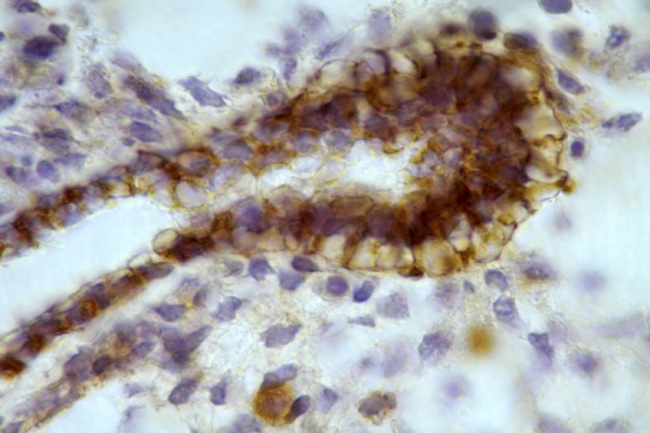You have /5 articles left.
Sign up for a free account or log in.

Human fetal lung tissue
Getty Images
The Trump administration in September launched a comprehensive review of all research involving human fetal tissue, which has helped researchers make headway in studies of macular degeneration and infectious diseases like HIV and the Zika virus.
The review followed pressure from antiabortion groups like the Susan B. Anthony List as well as members of Congress in recent months to end federal support for the research. Although university and research groups have said there appears to be a genuine interest in getting the science right at the Department of Health and Human Services, the agency has taken several steps recently to limit ongoing research and promote alternatives to fetal tissue that scientists say aren't viable.
Just after launching the review, the agency barred scientists from the National Institutes of Health from acquiring new human fetal tissue for research. The decision, which was made without any public announcement, only became public Friday thanks to a report in Science.
And on Monday, the National Institutes of Health said it would fund new studies to develop alternatives to human fetal tissue.
The announcement follows reporting that cast doubt on the long-term funding prospects for a multimillion-dollar research contract at University of California, San Francisco, to test new treatments for HIV.
The use of fetal tissue in federally backed research is extremely controversial among antiabortion groups, because much the tissue comes from aborted fetuses. The Department of Health and Human Services put a moratorium on federal support for research using fetal tissue from elective abortions in 1988. But President Clinton reversed the moratorium in 1993, and the same year Congress legalized federal funding for the research. The National Institutes of Health, which is housed in the Department of Health and Human Services, provided $103 million to back fetal tissue research this year. It’s expected to provide $95 million in research funding in 2019.
While the HHS review is underway, the backers of fetal tissue research are hoping to have their say. Even as the administration take steps that appear designed to placate antiabortion groups, science groups say HHS hasn’t yet made a change of policy on the research.
“I think there is a genuine interest in getting a strong understanding of the science,” said Jennifer Poulakidas, vice president for congressional and governmental affairs at the Association of Public and Land-grant Universities.
APLU is one of a number of higher ed organizations, research advocates and patient groups that are weighing in on talks with HHS as the agency carries out its review of the research.
“Science is changing very rapidly these days in any number of areas. It makes sense to get on top of that,” said Jennifer Zeitzer, director of federal relations at the Federation of American Societies for Experimental Biology. “We’re taking HHS at its word, and we want to help them do that.”
In recent months, though, the administration has made changes suggesting skepticism of the research. Last month, President Trump appointed a University of Utah academic, whose views on “fetal pain” are far outside the scientific mainstream, to a White House scientific advisory board.
When it launched its comprehensive review in September, HHS also dropped a contract with laboratory research services firm Advanced Bioscience Resources Inc. to provide fetal tissue to the U.S. Food and Drug Administration because it said it was not "sufficiently assured" the material was obtained in a way that complied with federal law.
“As a result, that contract has been terminated, and HHS is now conducting an audit of all acquisitions involving human fetal tissue to ensure conformity with procurement and human fetal tissue research laws and regulations,” an agency spokeswoman said. “In addition, HHS has initiated a comprehensive review of all research involving fetal tissue to ensure consistency with statutes and regulations governing such research, and to ensure the adequacy of procedures and oversight of this research in light of the serious regulatory, moral, and ethical considerations involved.”
The agency also said it’s looking into alternatives to the use of human fetal tissue in federally funded research, a priority NIH delivered on with its announcement Monday.
While opponents and backers are watching that process unfold, uncertainty over federal support for fetal tissue at UCSF appeared to signal a new approach on federal funding. The Washington Post reported last week that the Trump administration has sowed doubt over the continuation of an NIH contract with a university laboratory.
The investigator who runs that lab, which has tested most drugs to prevent or treat HIV infection, the Post reported, was given a 90-day extension instead of the typical one-year, $2 million extension.
But HHS after that story issued a rare and forceful statement pushing back on suggestions the contract would be canceled.
“Regarding the extension on the UC San Francisco contract, no final decision has been made. A decision will be made when the contract has been reviewed, pursuant to the ongoing audit/review process,” said HHS spokeswoman Caitlin Oakley in an email to Inside Higher Ed.
Oakley did not provide details on a timeline for review but said, “When we have more to announce on the progress of the review, we will.”
The University of California System declined to comment on the status of the NIH contract. Spokeswoman Claire Doan said in a statement that fetal tissue material is vital to finding treatments and cures for a wide variety of diseases and medical conditions.
“This research is conducted in full compliance with federal and state law, as well as ethical standards, and is in keeping with the university’s education, research and public service missions,” Doan said.
The most vocal antiabortion groups for their part have called the ongoing HHS review "completely inadequate."
“Secretary [Alex] Azar must put an immediate moratorium on funding for research using aborted baby organs and tissue purchased from the abortion industry,” said Susan B. Anthony List president Marjorie Dannenfelser after the agency announced the review in September.
Scientists say they are worried about the accuracy of information the administration is receiving from those groups.
“The pro-life community that’s pressuring the Trump administration is making claims that stem cells of various types can replace fetal tissue, and that’s scientifically untrue,” said Larry Goldstein, a neuroscientist at the University of California, San Diego. “As long as HHS relies on good, solid facts from knowledgeable sources, we welcome review.”








